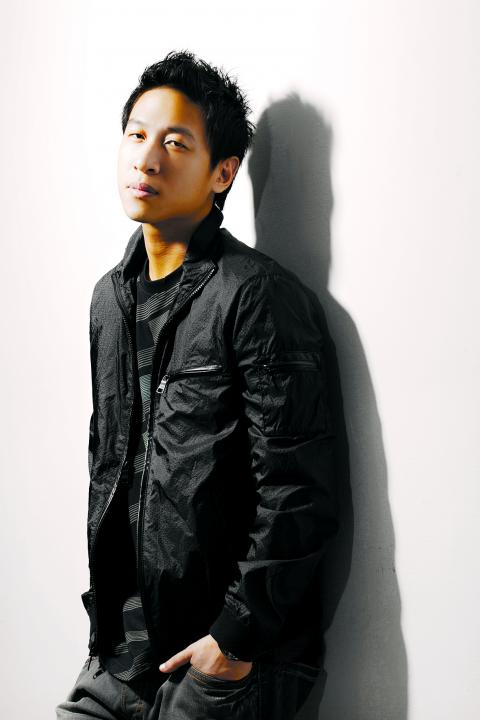Think French electronic music and Daft Punk immediately comes to mind. When people talk about Dutch electronic music, they inevitably mention Tiesto or young bucks of the dirty Dutch sound like Laidback Luke and Chuckie. What about Taiwan? Who is the most famous electronic music producer here?
Some people might say Xuan, but he produces more than just bleeps and blips. Mr. Uppity, GMB, and D. Hooker all produce their own tracks but have yet to make the jump to the big leagues. What about Taiwanese native Jerry Aseret, who plays at Crossover tomorrow night at inHouse?
Recently, Marco Carola, Italy’s king of techno, played Aseret’s latest single, Our Move, on BBC’s Radio 1’s Essential Mix. For DJs, this is the equivalent of a singer having his or her tune featured on the closing credits of American Idol. “I think I’ve finally found my sound,” Aseret told the Vinyl Word on Wednesday.

Photo Courtesy of Jerry Aseret
Aseret has been deejaying house, electro, and even a bit of trance since 2000. In 2005, he started making his own music. “Producing is the next level for deejaying,” he said.
His mentor, Thomas Tenton, gave him some samples, helped him out with the software and taught him how to engineer his sounds. Soon Aseret was on his way. “It took me four or five years to learn how to control the sound,” he said. “I would read the manuals over and over and watch tutorials on YouTube all the time.”
While producing tracks in various genres, Aseret got signed to Nervine Records, a tech house label out of Norway. “My manager at Nervine told me to focus on one sound, more tech and less deep house,” Aseret said. “Now that Marco Carola played one of my songs, I feel a lot more confident in my abilities.”
■ Crossover featuring Jerry Aseret and Osamu M is tomorrow night from 10pm to 3am at inHouse, 90 Songren Rd, Taipei City (台北市松仁路90號). Tel: (02) 2345-5549. Admission is free
The Wall (這牆) has recently been renovated to smooth out the rough spots for its complicated schedule of parties on weekend nights. Bands are booked there to play early, usually until 11:30pm, and then DJs take over from midnight on. Bands, though, tend to go late. This means that there is a huge crowd of people leaving as the DJs are trying to set up their equipment and get things ready for their parties.
To alleviate some of these crisscross crises, The Wall has stuck the bar outside in the hallway and now there are two areas — one inside and one at the bar — for DJs to play. This means that the people who are leaving might stick around and the ones that are early don’t have to just stand there and wait.
Yoshi Nori, who partners up with Spykee Fat tomorrow for Midnight Mix, explained: “Spykee wanted to do something a bit different this time, so he’s going to start playing a post-rock set outside at the bar at 11:30pm. Inside there’s more space to dance and it’s darker. It has a more live house feel in there. Also, I think the sound system is crispier now.”
When asked whether people would just hang out in the hallway since there is music and a bar and not pay the entrance fee, Nori said: “Don’t worry. There will definitely be a party inside.”
■ Midnight Mix is tomorrow from 11:30pm to 4am at The Wall (這牆), B1, 200, Roosevelt Rd Sec 4, Taipei City (台北市羅斯福路四段200號B1). Admission is NT$400 at the door and includes a drink.
Another big show this weekend is the second annual celebration called Welcome Back to 2nd Floor. Headliners include Ferry Corsten, Solarstone and Jochen Miller, who share the bill with the creme de la creme of local DJs. If trance is your thing, then this is your night.
■ Welcome Back to 2nd Floor tonight from 10pm to 4am at Luxy, 5F, 201, Zhongxiao E Rd Sec 4, Taipei City (台北市忠孝東路四段201號5樓). Call (02) 2772-1000 or 0955-904-600 for reservations (English service available). On the Net: www.luxy-taipei.com. Admission is NT$1,000 before 11pm or NT$1,200 after. Both include one drink

Late last month Philippines Foreign Affairs Secretary Theresa Lazaro told the Philippine Senate that the nation has sufficient funds to evacuate the nearly 170,000 Filipino residents in Taiwan, 84 percent of whom are migrant workers, in the event of war. Agencies have been exploring evacuation scenarios since early this year, she said. She also observed that since the Philippines has only limited ships, the government is consulting security agencies for alternatives. Filipinos are a distant third in overall migrant worker population. Indonesia has over 248,000 workers, followed by roughly 240,000 Vietnamese. It should be noted that there are another 170,000

Enter the Dragon 13 will bring Taiwan’s first taste of Dirty Boxing Sunday at Taipei Gymnasium, one highlight of a mixed-rules card blending new formats with traditional MMA. The undercard starts at 10:30am, with the main card beginning at 4pm. Tickets are NT$1,200. Dirty Boxing is a US-born ruleset popularized by fighters Mike Perry and Jon Jones as an alternative to boxing. The format has gained traction overseas, with its inaugural championship streamed free to millions on YouTube, Facebook and Instagram. Taiwan’s version allows punches and elbows with clinch striking, but bans kicks, knees and takedowns. The rules are stricter than the

“Far from being a rock or island … it turns out that the best metaphor to describe the human body is ‘sponge.’ We’re permeable,” write Rick Smith and Bruce Lourie in their book Slow Death By Rubber Duck: The Secret Danger of Everyday Things. While the permeability of our cells is key to being alive, it also means we absorb more potentially harmful substances than we realize. Studies have found a number of chemical residues in human breast milk, urine and water systems. Many of them are endocrine disruptors, which can interfere with the body’s natural hormones. “They can mimic, block

Pratas Island, or Dongsha (東沙群島) had lain off the southern coast of China for thousands of years with no one claiming it until 1908, when a Japanese merchant set up a facility there to harvest guano. The Americans, then overlords of the Philippines, disturbed to learn of Japanese expansion so close to their colony, alerted the Manchu (Qing) government. That same year the British government asked the Manchus who owned the island, which prompted the Manchu government to make a claim, according to South China Sea expert Bill Hayton. In 1909 the government of Guangdong finally got around to sending